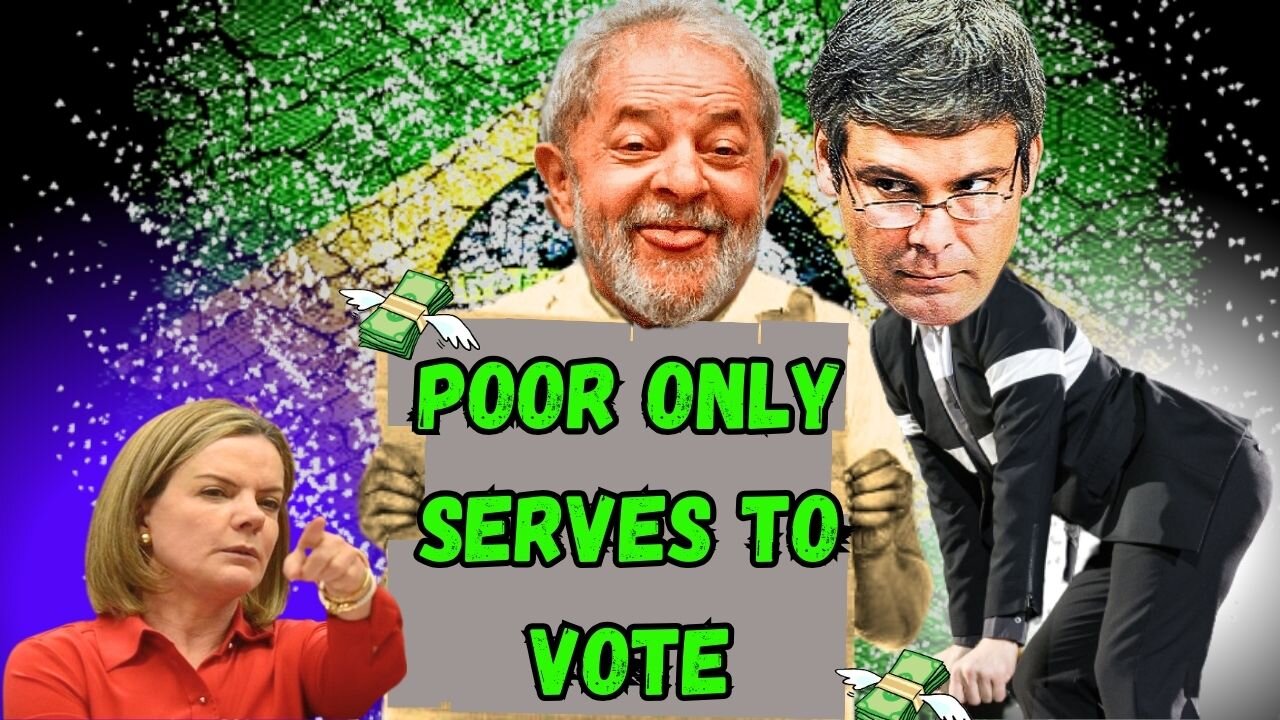Premium Only Content

"Between Ideologies: The Brazilian Poor People in the Political Maze"
Friends, today I want to address a topic that has sparked heated debates in our country: the role of left-wing ideologies in Brazilian society, especially in the Northeast. It's important to emphasize that this chronicle does not intend to demonize any political group but rather invite you to reflect on the complex issues surrounding this subject.
It is undeniable that left-wing ideologies have played a negative role in Brazilian politics, with leaders like Luiz Inácio Lula da Silva assuming prominent positions. However, it is important that we maintain a critical perspective on the actions of any government, regardless of its political orientation.
In recent years, we have observed situations in Brazil that deserve our attention. Some argue that income distribution policies implemented by left-wing governments, such as Bolsa Família, have helped combat poverty and inequality. However, it is also true that, in some cases, these policies are creating a dependency on the state, which in turn traps families in a drip-by-drip cycle of social assistance.
The comparison with Venezuela and the government of Nicolás Maduro is a valid warning for Brazilians. The humanitarian crisis in Venezuela, with family separations and shortages of food and medicine, is an extreme example of how an ideology can lead to disastrous consequences. Brazil needs to stay away from this scenario, and it is important that we remain vigilant to ensure that social policies are effective and do not perpetuate dependence.
The mayors of the Northeast, most of whom supported PT (Workers' Party) governments, have faced significant challenges. Many of them now regret their choices as they see their cities struggling to recover from financial and administrative crises. It is essential that these leaders, regardless of their political orientations, work for the benefit of their communities, prioritizing the well-being of the citizens.
The artistic and journalistic community also plays an important role in our society. Constructive criticism and impartial journalism are essential for democracy. However, it is true that some remained silent because they benefited from Lula's mismanagement and became complicit. The use of public resources, such as the Rouanet Law, to finance cultural projects must be closely monitored to prevent abuses.
It is essential that as citizens, we are willing to question and criticize the government, regardless of its political orientation. We must demand transparency, accountability, and oversight from our leaders. Ultimately, the well-being of Brazilian families should be the top priority, and it is our duty to ensure that this is achieved fairly and sustainably, regardless of the prevailing ideology at the moment.
-
 2:39:09
2:39:09
LFA TV
19 hours agoTHE ARK ENCOUNTER LIVE EVENT! 7.26.25 9AM EST-12PM EST
201K26 -
 3:20:34
3:20:34
Sgt Wilky Plays
4 hours agoTherapeutics with Dr Kong
12K -
 1:10:23
1:10:23
Man in America
1 day agoAre MK-Ultra Parasites Rewiring Your Brain? | Detoxing, Peptides & Parasite Warfare w/ Diane Kazer
42K56 -

TheSchleppy
1 day ago $0.70 earned✨TheSchleppy✨24HR 2 YRS ON RUMBLE STREAM! RIGHT INTO RUMBLE HALO EVENT!
13.2K5 -
 3:08:21
3:08:21
JakRazGaming
5 hours agoPlaying Ghost of Tsushima DIRECTOR'S CUT!! on PS5 Stream 6
20.9K2 -
 29:06
29:06
Scary Mysteries
1 day agoThe Corpsewood Manor Murders: Satan, Secrets, and a Savage End
18.4K13 -
 2:08:56
2:08:56
Lara Logan
1 day agoUNHOLY EXPERIMENTS: Justin Goodman Exposes the Evil of Animal Torture | Ep 28
18.9K32 -
 LIVE
LIVE
The Sufari Hub
4 hours ago🔴SUFARI AUGUST SHOWCASE 🔴W CONTENT 🔴 10 SUBS? 🔴WHAT SHALL WE DO THIS COMING MONTH?
12 watching -
 3:08:40
3:08:40
CHiLi XDD
5 hours agoSTREET FIGHTER 6 - Rise and Grind to Master!
5.2K -
 36:27
36:27
Degenerate Plays
1 day ago $0.45 earnedStatic Shock Actually Changed My Life - Batman: Arkham Asylum : Part 10
8.19K